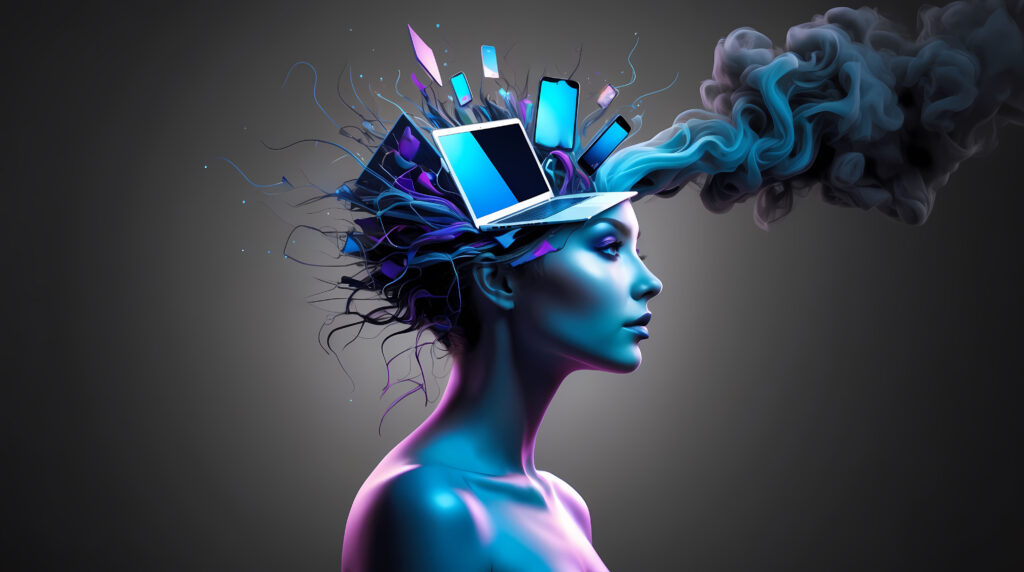
Introduction
And with artificial intelligence (AI), industries ranging from healthcare to entertainment are completely automated, content is generated, and AI is even responsible for art. AI is fantastically efficient and convenient; however, there is increasing worry that AI is also taking the creativity out of humans. With AI tools like ChatGPT, DALL-E, and MidJourney getting increasingly sophisticated, people are counting on them to create ideas, write content, and create visuals, at the risk of their being creative.
The Convenience Trap: Why We Rely on AI
- AI-powered tools provide instant solutions, making it easy to:
- In seconds, generate blog posts, essays, and marketing copy.
- With no traditional skills to learn, you can create artwork, logos, and designs.
- Compose music or scripts with minimal effort.
While this does save time, it creates a dependency as well. Many people now use AI to get quick answers instead of coming up with their first ideas, cutting out deep and original thinking.
How AI Undermines Creativity
1. Reduced Problem-Solving Skills Creativity thrives on overcoming challenges. When there is a ready AI solution, people skip the critical thinking process that’s fueling innovation. As time goes on, this can cause something to weaken your problem-solving skills.
2. Homogenization of Ideas What comes out of an AI is a pattern based on patterns already present. In turn, it results in repetitive, generic outputs rather than fresh and creative ideas. The less original the content will be because as people discover this artificial intelligence technology, the greater the use of AI for news content will be.
3. Decline in Skill Development Practice and failure are very important marks of writing, drawing, or composing music, as they are of learning creativity. AI does this by cutting out their own personal style and skill development process for users.
4. Over-Reliance on AI Suggestions Nowadays, many creators use AI as an inspiration, which can restrict their thinking. They have chosen not to innovate with odd ideas, and instead will take the opportunity to brainstorm AI-engendered answers, which are normally secure and predictable.
The Psychological Impact. The joy of creation is not exclusive to the output but also to creativity. Studies have revealed that creative activities can improve your mental well-being. Once AI duels are over, people may now feel less satisfied because work is no longer created by them anymore.
The Psychological Impact
The joy of creation is not so much in the output as it is in the creativity itself. There have been studies to suggest that creative activities help in preserving mental well-being. People will feel unfulfilled if AI takes over, because they are no longer the main creators of their work.
Can AI and Creativity Coexist?
AI doesn’t have to tear down creativity; it can empower it with the right tools at its disposal. Rather, people should use AI in direct support of humankind instead of completely relying on it.
- Do not replace humans with AI (e.g., for creating ideas, use AI as a tool).
- Give yourself some time (alone) to do unstructured, unassisted creative thinking.
- Experiment outside of AI suggestions to explore true original ideas.
Conclusion
On the one hand, AI is extraordinarily beneficial, but on the other, it threatens to leave us even more intellectually lazy. All true creativity comes from struggle, experimentation, and human imagination, which AI cannot replicate. For our creative power to be preserved, we have to use AI as an aide rather than a replacement in the process of original thought.
Reference:
Bown, O. (2021). Beyond the creative species: Making machines that make art and music. MIT Press.
Epstein, Z., Hertzmann, A., & the Investigators of Human Creativity. (2023). Art and the science of generative AI. Science, 380(6650), 1110-1111. https://doi.org/10.1126/science.adh4451
Kim, J., & Lee, J. (2022). Does AI kill or cultivate creativity? A study of human-AI co-creation. Computers in Human Behavior, 134, 107324.
OpenAI. (2023). GPT-4 technical report. https://arxiv.org/abs/2303.08774
Runco, M. A., & Jaeger, G. J. (2012). The standard definition of creativity. Creativity Research Journal, 24(1), 92-96.